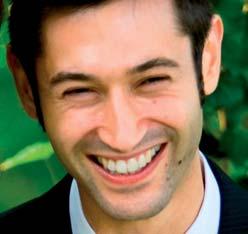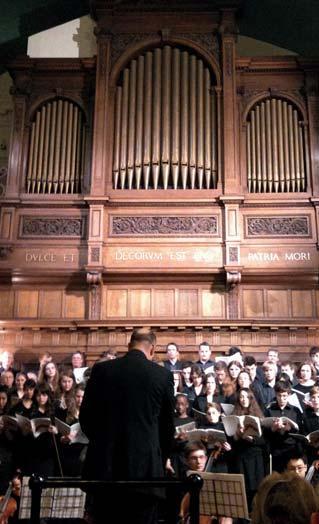
5 minute read
The RGS in China
from ONA 86
By Bill Gibson (63-69), RGS Maths Teacher
Way back in 1983 and 1984 Dave Merritt (63-73) and I took a group of RGS pupils to the then Soviet Union, visiting Moscow and Leningrad (now St Petersburg). Some of you reading this article may have been on one of those trips! Later the RGS developed an exchange partnership with a school in Tambov. This came to an end in 1992, but in recent years there have been RGS visits to Moscow and St Petersburg.
Advertisement

Now, near the end of my teaching career at the RGS, I find myself preparing to take a group of RGS students (as we now call them) to visit China. This has come out of visits by me to Shijiazhuang, the capital of Hebei province, in December 2009 and 2010. (Hebei is the province which surrounds Beijing.) I went out to try to discover why Chinese secondary schools seem to produce such good mathematicians. The answer seems to be: (a) mathematics is seen as a very important subject, (b) the Chinese students want to do well in it, and (c) they work extremely long hours. My visits were arranged by a contact in Newcastle who helps to arrange partnerships between schools in our region and schools in Hebei province.
These visits were for my own interest, so I paid for the flights myself. Dr Trafford kindly gave me some days off school to facilitate the arrangements. Much to my surprise, the Hebei Ministry of Education paid for my accommodation and transport once I arrived in China.
In October 2011, several schools in Newcastle were approached about the possibility of taking a few Chinese students from Hebei province into their Sixth Forms. The RGS, Dame Allan’s and the Church High School expressed an
interest in this scheme. Dr Trafford decided that if the RGS were to be involved in this programme, it should also be involved in the exchange programme which has been running for some years and which now involves about fifty schools from Alnwick down to Middlesbrough. Consequently, he and his wife went out in November 2011, along with representatives of Dame Allan’s and the Church High School, to visit the proposed partner schools and to see a little of Beijing. He returned very enthusiastic, as you may have read on his blog.
Our partner school is Tangshan No.1 Middle School. Tangshan is a city of over seven million inhabitants and is about 100 miles east of Beijing. The name may be familiar because it was largely destroyed by an earthquake in 1976! It is actually a “senior high school”, taking our Years 11-13, or Fifth and Sixth Forms for those of you from an earlier vintage. It has a history stretching back over a century, but the current buildings were erected recently and it has about 4,100 students, most of whom are boarders. It already has links with schools in many countries and over half of their students go on to study at international universities.

In December 2011 I made my third visit to China. My time was divided between our partner school in Tangshan and a junior high school (Years 8-10) in Baoding. I spent about a week in each school, working with teachers and comparing their syllabi in mathematics and the sciences with ours. The conclusion was that generally they were ahead of us, especially in mathematics.
On my first visit to a school in China, I was amazed when the head teacher asked me to do some teaching. When I asked who would translate, I was told that the pupils would understand me! Thus I ended up giving a series of 90 minute talks on quite diverse topics… and the pupils did seem to understand me.
Nevertheless, the biggest obstacle to Chinese students coming into our Sixth Form is their English. We are talking of only a handful coming in any year, so they need to be integrated into normal classes and there cannot be much allowance for not being a native speaker. This project is still developing, with the target of the first Chinese students coming in September 2013.
A key part of the exchange programme is students visiting their partner schools. The first RGS visit to China is scheduled for October 2012. The visit was only arranged after my visit last Christmas and is also quite expensive, so only eight RGS students are going. But that is probably quite good for the initial visit. We are going out for the week before the half term and the half term itself. We fly to Beijing, have a couple of days sightseeing there, and then transfer to Tangshan. We have five days there. We shall be staying in a hotel, but expect to spend time in the school and with families. There will be a programme of lessons and visits. After that we return to Beijing and then take the overnight train down to Xian (no doubt reminding me of the overnight Moscow to Leningrad train!) to see the terracotta warriors. Finally, we return to Beijing for a day and then fly home. Hopefully this will become an annual event in the RGS programme.
Probably we shall host some students from Tangshan during their Chinese New Year holiday in January/February 2013.
There is also the possibility for our gap year students to spend a year, or half a year, in Tangshan No.1 –or somewhere else –helping with the teaching of English. Most of their expenses will be paid by the Chinese and they should be able to combine some sightseeing with their work. Some of those going on the trip in October have already expressed an interest in this.
Another aspect of the partnership was a very brief visit to the RGS in June by the headmaster of Tangshan No.1 Middle School, with two members of his team. Also, Dr Trafford and his wife returned to Tangshan for the school’s 110th anniversary celebrations in late September.
Since the RGS is part of the Hebei partnership scheme, there is also the possibility for a few teachers to go and help to teach English for two weeks on a summer camp and have a week’s holiday, with everything apart from the visa and insurance paid for by the Hebei Ministry of Education. Three RGS teachers did this in the summer.
Hopefully some of the teachers of English from our partner school will be able to come to visit us in order to improve their English, collect some resources, familiarise themselves with the RGS and tell us something about their school and their country.
I have found my visits to China to be both pleasant and interesting. I hope that some of our students and staff will have a similar experience.







